The global bicycle lights market size was valued at $356.2 million in 2021, and is projected to reach $772.3 million by 2031, growing at a CAGR of 8.2% from 2022 to 2031.
Bicycle lights refer to the lights which are equipped to the bicycles to enhance the visibility of bicycle and its rider to other users at night or in poor visibility conditions. These lights aid in prevention of road accidents and enables riders to detect reflective items to enhance overall experience of the rider. Bicycle lights includes front lights, rear lights, flashing lights, rear reflectors and others. Generally, bicycle lights are segmented into two categories such as active lighting and passive lighting. Active lighting includes any lighting which is required to be activated by a person. It includes headlights and taillights. Passive lighting is not required to be activated by a person. It includes reflectors and reflective materials. Moreover, numerous types of bicycle lights are available in the market which includes battery-powered lights, rechargeable lights, LED lights, Halogen lights, and others.
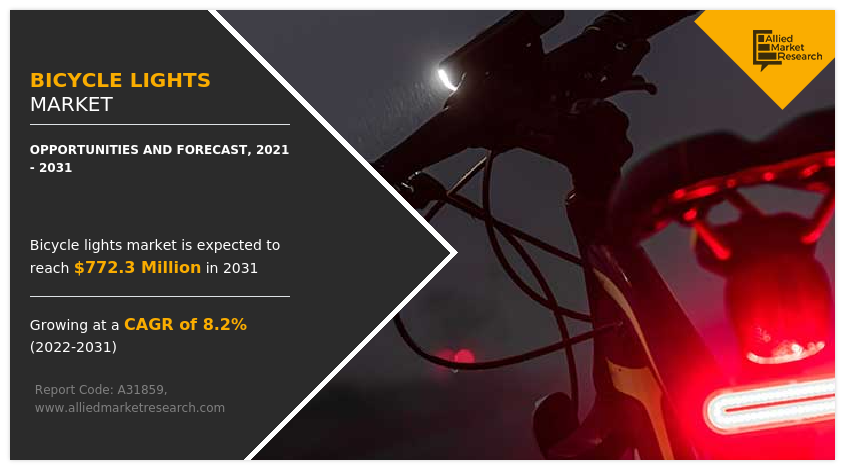
The growth of the global bicycle lights market is driven by government regulations to encourage adoption of bicycle lights, increase in fuel costs, rise in interest in cycling as a fitness & recreational activity, and rising adoption of e-bicycles. However, lack of bicycle infrastructure is the factor hampering the growth of the market. Furthermore, improvement in bicycling infrastructure is the factor expected to offer growth opportunities during the forecast period.
The bicycle lights market is segmented based on technology, mounting type, bicycle type, application, and region. By technology, it is fragmented into LED, halogen, and xenon. By mounting type, it is categorized into headlight, and taillight. By bicycle type, it is fragmented into conventional and electric. By application, it is classified into commuting bicycle, off-road bicycle and others. By region, the report is analyzed across North America, Europe, Asia-Pacific, and LAMEA.
Asia-Pacific includes China, Japan, India, South Korea, and rest of Asia-Pacific. Rest of Asia-Pacific includes Australia, New Zealand, Indonesia, Singapore, Malaysia, Vietnam, and others. The bicycle lights market has great prospects in the Asia-Pacific, owing to increase in bicycle as well as electric bicycles sales in these countries. China is the leading country in this region, in terms of production, sales, and export of electric bicycles.
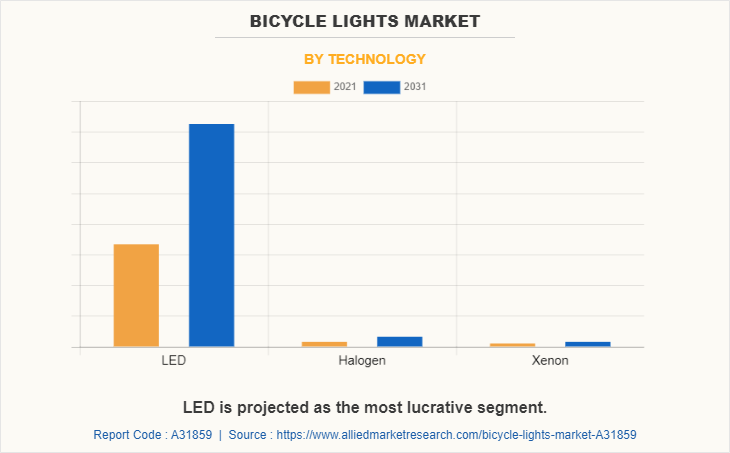
The preference for bicycles has increased in Asia-Pacific as compared to conventional modes of transport, owing to advantages of bicycles such as light weight, eco-friendly nature, requirement of less power, and cost-effectiveness. In addition, Chinese bicycle sharing companies are working toward expanding their operations in India and Australia. Moreover, several initiatives taken to promote bicycle commutation coupled with development of related infrastructure from several governments such as India and Australia, are anticipated to boost growth of the bicycle lights market in Asia-Pacific.
China has strengthened its industry leadership by making profits across all scopes of the supply side of bicycles including current & projected production of bicycle and their components. For instance, as per the China Bicycle Association, the production of Chinese bicycle industry reached nearly 116.54 million bicycles in 2020, a year-on-year increase of 15.3%. The annual export volume of bicycles and electric bicycles and related parts reached $7.88 billion in 2020, an increase of 23.1% as compared to 2019. In addition, China launched various initiatives for green transportation, which further fueling the growth of the bicycle lights market in the country.
Indian government is taking several initiatives to promote bicycles as well as electric bicycles across India, which in turn is contributing in the growth of the market. For instance, in August 2022, Spur Technologies, a Hero subsidiary, unveiled its new bicycle component manufacturing unit at Dhanansu e-cycle valley to reduce dependence of bicycle manufacturer on imported components from China. In addition, in September 2020, the Gujarat Government announced a subsidy scheme to encourage the use of e-bicycles and e-rickshaws. Moreover, expansion of global players in India is further expected to fuel the market growth in the country.
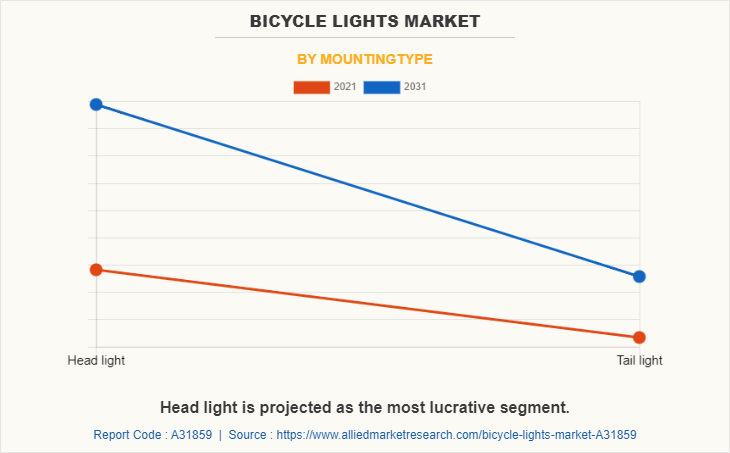
In South Korea, several cities are focusing on enhancing their bike-sharing service by introducing new bicycle into the bike-sharing service. For instance, the Seoul Metropolitan Government which announced a plan, in 2018, to broaden its fleet of public bicycles from 20,000 to 40,000 by 2020, further announced an upgrade plan to introduce 6,000 new bicycles by 2023 into the bike-sharing service to enhance convenience of the Capital’s public bike-sharing service. Such developments are expected to increase the demand for new bicycles in the country, which in turn will create the demand for bicycle lights and will supplement the growth of the market in the country during the forecast period.
Rest of Asia-Pacific includes Australia, New Zealand, Indonesia, Singapore, Malaysia, Vietnam, and others. In Australia, increase in health consciousness among consumers, rise in fuel prices, high traffic congestion, rise in environmental concerns, and surge in government initiatives to promote cycling to reduce carbon emissions are the major factors that drive growth of the bicycle lights market in Australia. For instance, according to the Bicycle Industries Association (BIA) Australia, as of 2019, the number of electric bicycles imported to Australia has tripled over past three years and sales are growing faster than any other segment of the Australia bicycle market, with more than 50 brands offering a range of models.
Some leading companies profiled in the report includes BBB Cycling, Cateye Co., Ltd., Cygolite Co, Gaciron Technology, Garmin Ltd., Lezyne USA Inc, Lord Benex International Co., Ltd, Lupine Lighting Systems GmbH, Princeton Tec, and Trek Bicycle Corporation.
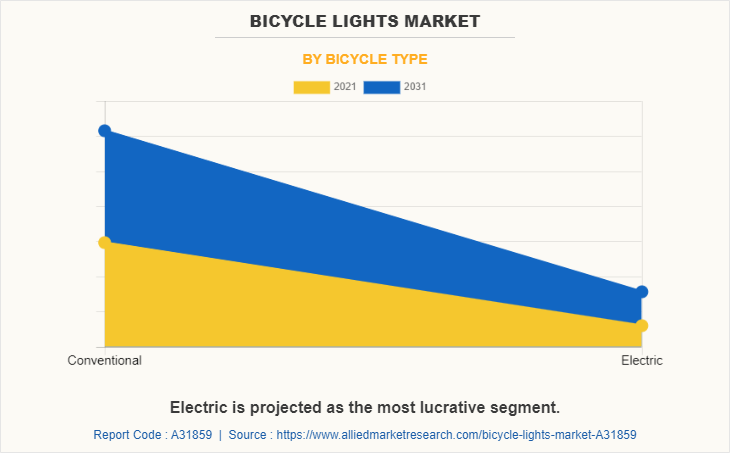
Government regulations to encourage adoption of bicycle lights
Governments of various countries are taking initiatives to reduce the carbon footprints by encouraging the use of bicycles, electric bicycles, and electric scooters, owing to increase in awareness toward the hazardous effects of using vehicles running on fossil fuels. Moreover, governments are constructing bicycle friendly streets, which are encouraging individuals to opt for bicycle as a key mode of commute. Furthermore, to encourage the use of electric bicycles, governments across the globe are supporting for the purchase of e-bicycles, in terms of tax credits and incentives.
With increase in adoption of bicycles and electric bicycles, government in several countries are also introducing rules and regulations to enhance bicycle rider safety, which in turn is encouraging adoption of lights in bicycles, and contributing in the growth of the market. For instance, in the U.S., bicycle riders are required to use a bright white headlight when riding during night time and the light beam should not extend at least 500 feet ahead. Similarly, in UK, as per the Road Vehicles Lighting Regulations (RVLR) 2009, lights and reflectors are required on a pedal cycle only between sunset and sunrise.
Increase in fuel costs
Increase in fuel prices is the result of surge in crude oil costs, which are majorly controlled by the Organization of the Petroleum Exporting (OPEC) countries. Thus, the increase in fuel costs over the past decade has led to rise in adoption of bicycles and electric bicycles as a mode of daily commute. Moreover, prices are expected to increase with limited sources of crude oil in the future. Although, the electricity costs compared to gasoline prices, have been low in many countries such as China, Germany, and Denmark, which is further fueling the demand for bicycles and electric bicycles in such countries. Furthermore, bicycles equipped with electric motors help in maintaining higher speed more effectively as well as make the ride more comfortable on rough roads. Therefore, increase in fuel cost is expected to fuel the consumer inclination toward bicycles and e-bicycles, thereby boosting the growth of the bicycle lights market.
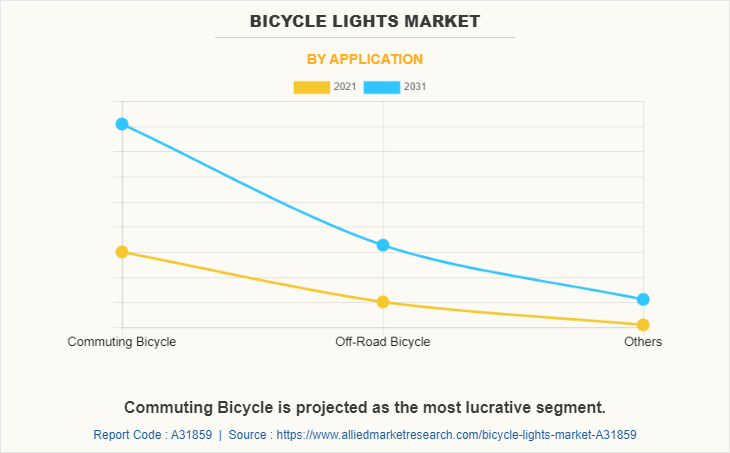
Rise in interest in cycling as a fitness & recreational activity
Presently, consumers have become more health conscious due to work-related stress and sedentary lifestyle. Majority of the individuals are investing their time in performing various fitness activities such as cycling, yoga, swimming, and running to remain healthy, fit, and active in daily life. Cycling is considered as a healthy and low impact activity, which has many physical and mental health benefits such as it builds endurance, alleviates stress, strengthens muscles, and improves cardiovascular health. In addition, increase in consumer preference toward recreational and adventure activities has created the demand for bicycles and electric bicycles, thereby fostering the market growth.
Rising adoption of e-bicycles
The demand for e-bikes is increasing across the globe owing to their fast & flexible operations and zero carbon emissions. In addition, an e-bike is the more-preferred option, as it better fulfils the requirement for higher speed in short-distance commuting, when compared to a pedal operated bike. Features such as higher speed, more convenience, effortless driving, and variable motor power as per the road conditions make e-bikes more preferred for daily commuting and mountain biking purposes. Moreover, after the pandemic, bicycle sales have risen as people have started to use bicycles to stay fit. Consumers also select greener e-mobility options over buying a car or using public transport, propelling the market demand. This increased adoption of e-bicycles is expected to increase the demand for bicycle lights and will contribute in the growth of the market during the forecast timeframe.
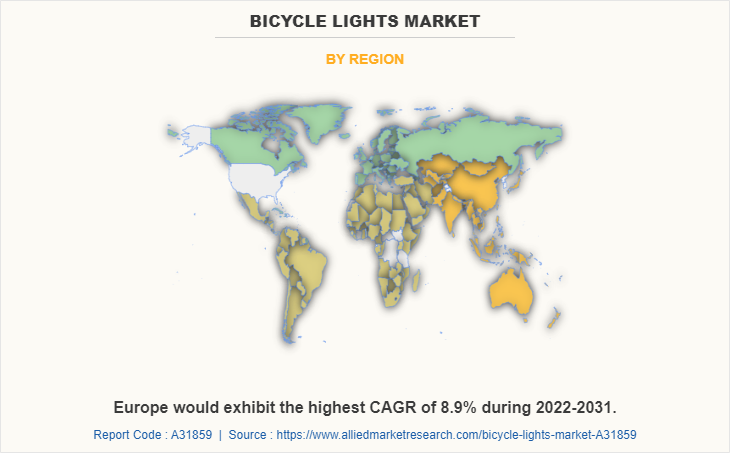
Key Benefits For Stakeholders
- This report provides a quantitative analysis of the market segments, current trends, estimations, and dynamics of the bicycle lights market analysis from 2021 to 2031 to identify the prevailing bicycle lights market opportunities.
- The market research is offered along with information related to key drivers, restraints, and opportunities.
- Porter's five forces analysis highlights the potency of buyers and suppliers to enable stakeholders make profit-oriented business decisions and strengthen their supplier-buyer network.
- In-depth analysis of the bicycle lights market segmentation assists to determine the prevailing market opportunities.
- Major countries in each region are mapped according to their revenue contribution to the global market.
- Market player positioning facilitates benchmarking and provides a clear understanding of the present position of the market players.
- The report includes the analysis of the regional as well as global bicycle lights market trends, key players, market segments, application areas, and market growth strategies.
Bicycle Lights Market Report Highlights
| Aspects | Details |
| Market Size By 2031 | USD 772.3 million |
| Growth Rate | CAGR of 8.2% |
| Forecast period | 2021 - 2031 |
| Report Pages | 213 |
| By Technology |
|
| By MountingType |
|
| By Bicycle Type |
|
| By Application |
|
| By Region |
|
| Key Market Players | Cateye Co., Ltd., Garmin Ltd., Lord Benex International Co., Ltd, Gaciron Technology, Cygolite Co, Lupine Lighting Systems GmbH, Lezyne USA Inc, BBB Cycling, Princeton Tec, Trek Bicycle Corporation |
Analyst Review
The global bicycle lights market is expected to witness growth due to due to rise in adoption of electric bicycles and government regulation to encourage adoption of bicycle lights.
Several countries are adopting electric bicycles as an efficient daily commute vehicle owing to climate changes taking place across the globe. In addition, governments across the globe are also providing incentive on the purchase of electric bicycle, which is boosting the adoption of electric bicycles. For instance, in May 2021, French government announced an incentive of $2,600 for purchasing an electric bicycle.
At present, several electric bicycles come equipped with lights. However, government in several countries are introducing rules for bicycles lights which in turn is contributing in the growth of the market. For instance, in Denmark, installing at least one headlight and one taillight that is visible from 300 meters for any bicycle is legalized.
The global bicycle lights market was valued at $356.2 million in 2021 and is projected to reach $772.3 million in 2031, registering a CAGR of 8.2%.
Some leading companies profiled in the report includes BBB Cycling, Cateye Co., Ltd., Cygolite Co, Gaciron Technology, Garmin Ltd., Lezyne USA Inc, Lord Benex International Co., Ltd, Lupine Lighting Systems GmbH, Princeton Tec, and Trek Bicycle Corporation
Europe is the largest regional market for Bicycle Lights.
Commuting Bicycle is the leading application of Bicycle Lights Market.
The upcoming trends include the introduction of several rules & regulations which mandates adoption of bicycle lights, rising fuel prices, and increase in adoption of electric bicycles for fitness related activities.
Loading Table Of Content...



